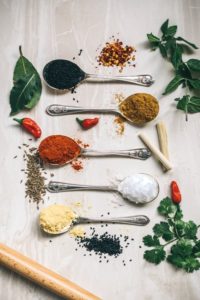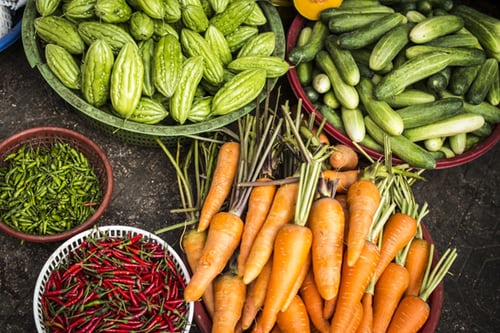Health Benefits of Herbs and Spices
To say I’m fascinated by food is not entirely true. I do try to eat as healthy as possible, but I’m definitely not a foodie. In school, I was the one eating leftover cold pizza for breakfast while rushing to class. Thankfully, I’m no longer quite that bad. Last year’s ankle injury and subsequent surgery made me more conscious about my eating habits. Recently, I attended a networking breakfast. The presentation that day was about herbs and spices and their benefits, especially for seniors. I’m not a finicky eater, I just try to eat less, drink more water, and add some “green stuff” to at least one of my meals. Until that presentation, I had never given much, if any, thought to the medicinal benefits of herbs and spices. Intrigued, I made some notes and did further research. I know now, that there are multiple health benefits of herbs and spices. Too many for this article to do justice.
Food for Thought

The presenters pointed out that the use of herbs and spices dated back to the early Greeks. Hippocrates (460-377 BC), wrote about spices and herbs, carefully researching and writing out roughly 400 remedies. About half of these are still in use today. Other Greeks, including Theophrastus and Dioscorides, made extensive use of herbs and spices. The Romans, Arabs, and Indians also used herbs and spices for their medicinal, healing qualities. It’s probably no surprise to know that there are herbal remedies for almost every part of your body, from the tips of your toes to the top of your head. Today we will be looking at different herbs and spices and their specific benefit.
The Benefits

I won’t bore you with the research on the benefits of a healthy diet. Believe me, there is an unbelievable amount of research on this topic. Sprinkle in some herbs and spices and the health quotient of your diet increases. Below are a dozen benefits and several of the herbs that help.
Joint health – K. Aleisha Fetters, a freelance Health and wellness reporter at U.S. News1, cites a report by the CDC which “points to arthritis as a leading cause of disability in the U.S., with 54.4 million adults being diagnosed annually.” Turmeric, black pepper, garlic, cinnamon, cayenne, ginger, cloves, and saffron are all known to help alleviate arthritis as well as strengthen bones and joints.
Digestive health – Emily Laurence, a certified health coach and senior writer at Well+Good2, shares five spices that aid in digestive health. These are ginger, mint, cinnamon, asafoetida, and turmeric. Other spices that also aid in digestive health include fenugreek, cinnamon bark, cilantro, cardamom, fennel seeds, lemon balm, and cumin.
Heart health – A well known integrative cardiologist and expert in nutritional health, Dr. Stephen Sinatra3, lists ten that will help keep your heart healthy. Included are cinnamon, garlic, ginger, onions, turmeric, curcumin, cayenne, capsaicin, rosemary, and cilantro.
Memory – A journalist, certified nutrition specialist, and a member of the American College of Nutrition4, Cathy Wong has, for over 16 years, written and cited numerous studies on how herbs and spices can combat Alzheimer’s as well as improve overall brain health. Herbs and spices known to improve memory and brain function include sage, lemon balm, ashwagandha, Gingko Biloba, ginseng, turmeric, and Gotu Kola.
Lower blood pressure – Citing a study by the American College of Cardiology that because of new guidelines, roughly half of all American adults are now considered to be suffering from hypertension or high blood pressure, Healthline5 has listed 10 herbs and spices known to help lower blood pressure. These are basil, cinnamon, flaxseed, garlic, ginger, hawthorn, cardamom, cat’s claw, french lavender, and celery seed.
Lower blood sugar – According to the American Diabetes Association6, approximately 12 million seniors over age 65 suffer from diabetes. Lori Zanini, a registered dietitian, certified diabetes educator, author, and spokesperson lists 6 that may aid in lowering blood sugar. These include oregano, sage, garlic, turmeric, ginger, and cinnamon.
Relief from Stress and Anxiety – Tiffany LaForge, a professional chef, and food writer, contributes to Healthline7 3 herbs and spices that may aid in the relief of stress and anxiety. These are passionflower, lavender, and valerian root.
Anti-inflammatory – Dave Asprey, founder & CEO of Bulletproof and New York Times8 bestselling author, lists 5 that have anti-inflammatory qualities. His list includes turmeric, cayenne, ginger, cinnamon, and cloves.
Anti-inflammatory – The NCBI9 (National Center for Biotechnology Information, a branch of the National Institutes of Health, has sponsored multiple research projects on herbs and spices and which ones are known to help treat or prevent cancer. Their findings include garlic, saffron, onion, black pepper, piperine, black seed oil, turmeric, and curcumin.
Eyesight – Tyler Sorensen, founder of Rebuild Your Vision10, for over two decades has worked with medical experts on combatting and preventing vision ailments like “glaucoma, cataracts, and macular degeneration.” The herbs and spices he lists include bentonite clay, fennel seeds, passionflower extract, bilberry, and Ginkgo Biloba.
Healthy teeth – Kim Dyoco, DDS, owner of One Mag Smile11, a cosmetic and general dentistry office in Chicago, contributes articles on cooking and oral health. Her list includes holy basil, rosemary, cinnamon, turmeric, and garlic.
Weight management – Patricia Bannan, RDN12, is “a nationally-recognized registered dietitian nutritionist, healthy cooking expert, and author.” She has written numerous articles on healthy eating and is much sought after by people looking to lose weight. Her top 6 herbs and spices for weight loss include fenugreek, cumin, rosemary, turmeric, ginger, and garlic.
Independence

Independence at any age begins with a healthy lifestyle. Seniors, for many reasons, are more susceptible to injury and disease than younger people. It becomes imperative that adult children do everything possible, to help their elderly parents enjoy a healthy lifestyle, This may mean adding spices and herbs to their diet. My research certainly did not uncover all the herbs and spices available for better health. Nor are the benefits mentioned here the only ones to be enjoyed. I hope my research will lead all adult children to encourage their elderly parents to add more spices and herbs to their meals.
Footnotes:
1). https://www.mccormickscienceinstitute.com/resources/history-of-spices
2). https://health.usnews.com/wellness/food/articles/2017-07-07/8-anti-inflammatory-spices-for-easing-arthritis
3).https://www.wellandgood.com/good-food/spices-for-digestion/
4). https://www.drsinatra.com/dr-sinatras-top-healing-herbs-and-spices
5). https://www.verywellmind.com/best-herbs-and-spices-for-brain-health-4047818
6) https://www.verywellmind.com/best-herbs-and-spices-for-brain-health-4047818
7). https://www.diabetes.org/resources/statistics/statistics-about-diabetes
8). https://www.lorizanini.com/is-the-key-to-lowering-your-blood-sugar-already-in-your-kitchen/
9). https://www.healthline.com/health/mental-health/herbs-for-stress-recipe#3
10) https://blog.daveasprey.com/best-anti-inflammatory-herbs-and-spices/
11). https://www.ncbi.nlm.nih.gov/pmc/articles/PMC4997408/
12). https://www.rebuildyourvision.com/blog/food-for-your-eyes/herbs-to-improve-your-eyesight/


Recent Comments